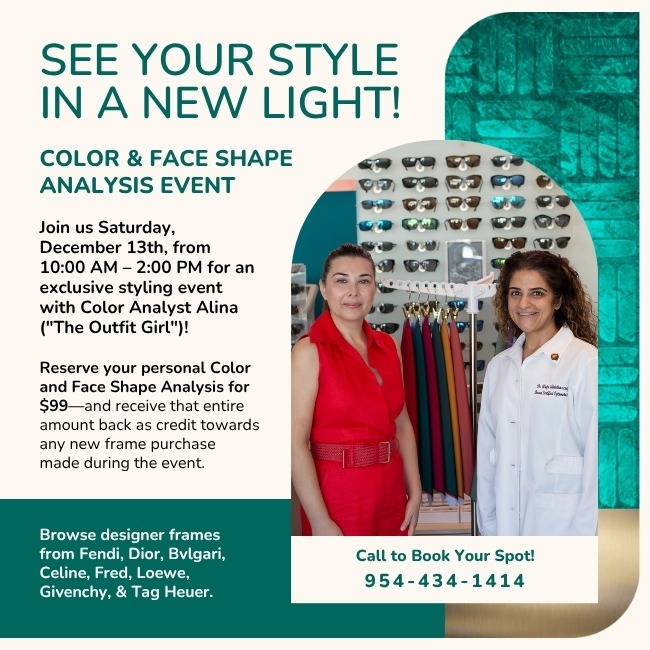Contact lenses offer freedom from eyeglasses and provide a natural field of vision, but require more maintenance and care.
As a general rule, contact lens wearers require annual eye exams to replenish their lens supply and support their overall health. An annual contact lens exam checks that your lenses fit comfortably, your prescription stays accurate, and your eyes remain healthy, even if you’re happy with your current contact lenses.
Routine eye exams go beyond monitoring your vision. They allow your eye doctor to evaluate your eye health and catch potential issues early, for timely management.
Your eyes change more often than you think, so it’s always better to err on the side of caution.
Your Guide to Contact Lens Exams
A contact lens exam differs slightly from a standard routine eye exam in that it goes a little bit further and checks whether your contacts are compatible with your vision needs and lifestyle.
Beyond monitoring your vision, your optometrist evaluates your eye health to confirm that your lenses aren’t causing any issues. The reason for this is that contact lenses sit directly on your corneal surface, making them more likely to affect your eye health and comfort than eyeglasses. A poorly fitted lens or outdated prescription could lead to discomfort, irritation, or even serious complications like corneal abrasions or infections.
For contact lens wearers, these eye exams are non-negotiable. Even if you feel like your vision hasn’t changed and your contacts are comfortable, your eyes might have changed since your last appointment.
Along with monitoring your vision, eye exams help detect issues like dry eyes, irritation, or early signs of eye conditions before they can snowball into greater problems. Besides, many states require annual contact lens prescriptions if you want to replenish your lens supply.
Regular eye exams are preventative care. Think of them as an investment in your lifelong vision.
How Often Should I Have an Eye Exam?
The standard recommendation is that contact lens wearers should visit their optometrist once a year. However, certain cases may require more frequent visits, for example:
- Beginners: If you’re new to contact lenses, your eye doctor may want to see you sooner to confirm your lenses are fitting well and your eyes are adjusting nicely.
- Contact lens type: Contact lenses come in various options to accommodate a range of concerns. Specialized lenses, like scleral lenses, Ortho-k, or extended-wear lenses, may require frequent check-ups to monitor for signs of oxygen deprivation.
- Health conditions: If you have dry eye syndrome, diabetes, or other health issues that can affect your eyes, more regular check-ins might be necessary.
- Discomfort or changes: If your eyes feel dry, or irritated, or if your vision feels off, don’t wait for your annual check-up—schedule an appointment right away.
Based on what the see, your optometrist might suggest switching the type of contact lens you wear.

Contact Lens Exams: What to Expect
As you can imagine, a contact lens exam requires further testing than regular eye exams. As a patient, there’s nothing to worry about, but understanding what goes into this visit can be helpful.
Here’s what you can expect during your annual contact lens exam:
- Prescription check: Your optometrist starts by evaluating your prescription to confirm it’s up-to-date. This includes determining whether your vision has improved, worsened or stayed the same.
- Corneal measurement: Poorly fitted lenses are uncomfortable and affect the quality of your vision. To prevent this, a special device measures the shape and curvature of your cornea, helping your eye doctor find the perfect fit.
- Tear health assessment: Tear production affects contact lens comfort. Your doctor will check your tear film to verify that your eyes are properly hydrated and won’t be adversely affected by your contacts.
- Eye health check: An overall assessment of your eye health helps detect any issues like infection, irritation, or damage to the cornea caused by contact lens wear.
- Contact lens fitting: If you’re new to lenses or switching brands, your optometrist will fit you with a trial pair to monitor their performance.
- Reviewing contact lens care: Since contacts directly interact with the eyes, following proper contact lens wear and care is vital. Based on your chosen lenses, your eye doctor will discuss how to clean, store, and wear your lenses correctly. Following these guidelines can prevent infections and extend the life of your lenses.
After your exam, you’ll leave with a renewed contact lens and eyeglass prescription, as well as the satisfaction of knowing that your eyes are healthy.
Is Skipping a Contact Lens Exam an Option?
The answer is simple: No.
Even if your vision feels fine, and your contacts feel comfortable and perform well, skipping your contact lens exam isn’t recommended. Eye exams have several crucial functions:
- Detecting health concerns early: Conditions like corneal ulcers, infections, or glaucoma often show no symptoms in their early stages. Regular exams are the only way to catch these problems early.
- Incorrect prescriptions: Wearing an outdated or incorrect prescription can lead to eye strain, headaches, and deteriorating eye health.
- Ill-fitting lenses: Lenses that don’t fit properly can cause irritation, redness, or scratches on your cornea. Over time, this might lead to serious complications that could threaten your vision.
Safeguard Your Sight
Don’t delay your regular eye exam. Your eyes are priceless, and safeguarding their health is worth it.
Bring your current lenses (if possible), note any issues, and be honest about your wear habits–it’s okay. Make the most out of your next contact lens exam. Our EyeQ Optical team is here to support you.
Connect with us today to schedule your next contact lens exam!




